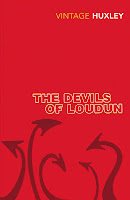The Devils of Loudun is a fascinating study in abnormal psychology, obsession and bizarre sexuality. In the 17th century French town of Loudun, Roman Catholic priest and ladies’ man Urbain Grandier is accused of witchcraft by Sister Jeanne, the local prioress. What ensues is an orgy of demonic possession culminating in the burning at the stake of Urbain Grandier. In this fascinating study Aldous Huxley brings wit and erudition to a bizarre set of psycho-sexual religious events.
It’s hard to figure out whether Huxley’s The Devils of Loudun, published in 1952, is fiction, history, theology, psychoanalysis or what (the back of my Panther edition calls it fiction, but Wikipedia lists it under ‘other’). Stylistically it moves between a seemingly fictional mode and a more detailed critical analysis, between the warm humanism of character development and a cool intellectual dissection. Huxley achieves this fusion seamlessly, delighting with his witty and urbane humour.
I first read The Devils of Loudun 20 years ago, and was prompted to re-read it after watching on DVD Ken Russel’s 1971 film The Devils. Russell based his film on Huxley’s novel and the stage play by John Whiting, first performed in 1961. The film is amazing, with Oliver Reed playing the Catholic priest Urbain Grandier who is accused of witchcraft, and Vanessa Redgrave hamming it up as the Prioress, Sister Jeanne of the Angels, a mad nun sexually obsessed with Grandier.
Due to the style and ambiguous status of this book (is it fact or fiction?), it’s hard to tell when Huxley is taking liberties with the story and when he is sticking to the facts. When the historical record is being set in a fictional voice, with characters given a rich and complex inner emotional life, it’s hard to figure out how exactly to read the text. Ultimately you would have to investigate the books provided in the bibliography, to figure out how much is fact and how much is fiction. Things are complicated further in Ken Russell’s film, as the opening titles say the story is true, but the screenplay chops and changes details from Huxley’s book. Perhaps the best way to read The Devils of Loudun is as a hybrid of fiction and literary analysis. Despite these juxtapositions, the book works extremely well and is an absolute joy to read.
The story is weird, and Huxley basically sets it as a tale of abnormal psychology which he puts under the lens of modern day behavioural science. He also adds many literary herbs and spices, reading events through poetry, theology and philosophy, giving the work a densely rich flavour. You really feel like you are at the feast of a great mind.
In the small town of Loudun in 17th century France, the Roman Catholic priest Urbain Grandier is accused by the Prioress of the local convent, Sister Jeanne of the Angels, of becoming possessed of devils because Grandier had made a pact with Satan. Sister Jeanne is a funny character. Cynical and with a coarse sense of humour, she’s only really a nun due to her low economic status. Further complicating matters, she is also sexually obsessed with Grandier. When she asks Grandier to become a spiritual advisor to the convent, he begs off. It’s presumed that for this reason Sister Jeanne brings up the accusations of witchcraft against him.
Urbain Grandier is himself an interesting character. A Catholic priest who indulges in the pleasures of the flesh, he’s a bit of a womaniser. His position in the town is being forever complicated by his prickly and uncompromising nature. He keeps putting people off and creating all sorts of political enemies until you just know he’s on a crash course with disaster. When Sister Jeanne accuses him of witchcraft, his enemies see an opportunity to bring him down. The culmination of these events, which included torture, was Urbain Grandier’s execution by burning at the stake on August 18, 1634.
The last section of the book deals with Sister Jeanne undergoing several exorcisms, notably under Jean Joseph Surin, a pathetic figure that Huxley seems strangely fond of. Surin offered his own spirit to be possessed by demons to save Sister Jeanne, and spent years harassed by evil spirits.
Huxley approaches this extraordinary material from a modern 20th century perspective. We are pretty much asked to scrutinise these deluded souls by current criteria. This is not to say Huxley looks down on his subjects. He is equally fascinated and appalled by the carryings on of these crazed exorcists and nuns.
Re-reading this highly original and accomplished study of religiously inspired madness and self-delusion has prompted me to read more Huxley. He’s an intellectual and original with a keen sense of fun.
The Devils of Loudun, by Aldous Huxley. Published by Vintage Classics. ISBN: 9780099477761. RRP: 12.95

No comments:
Post a Comment